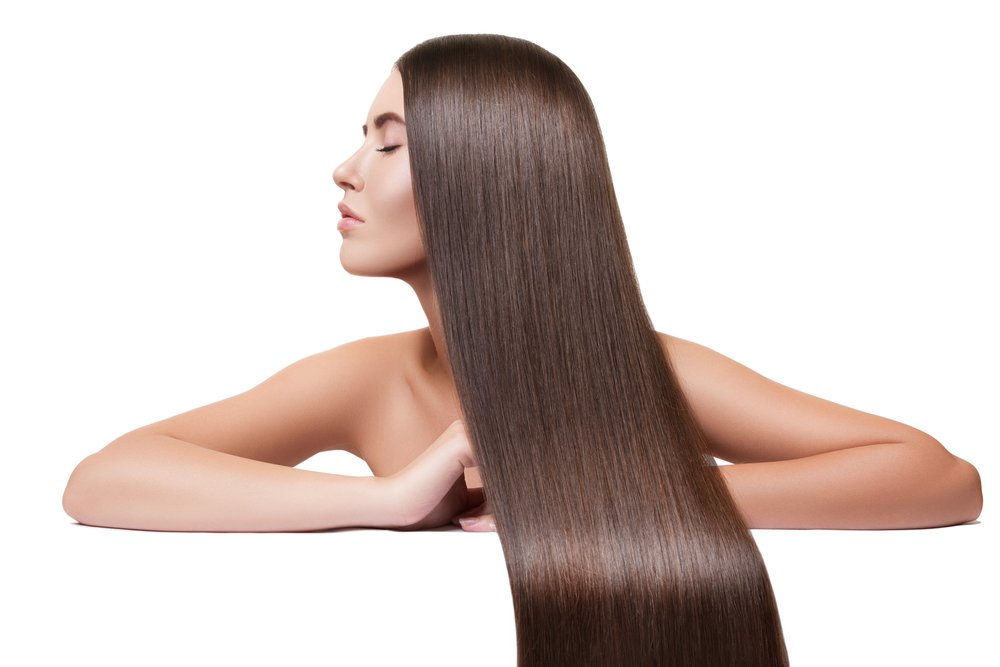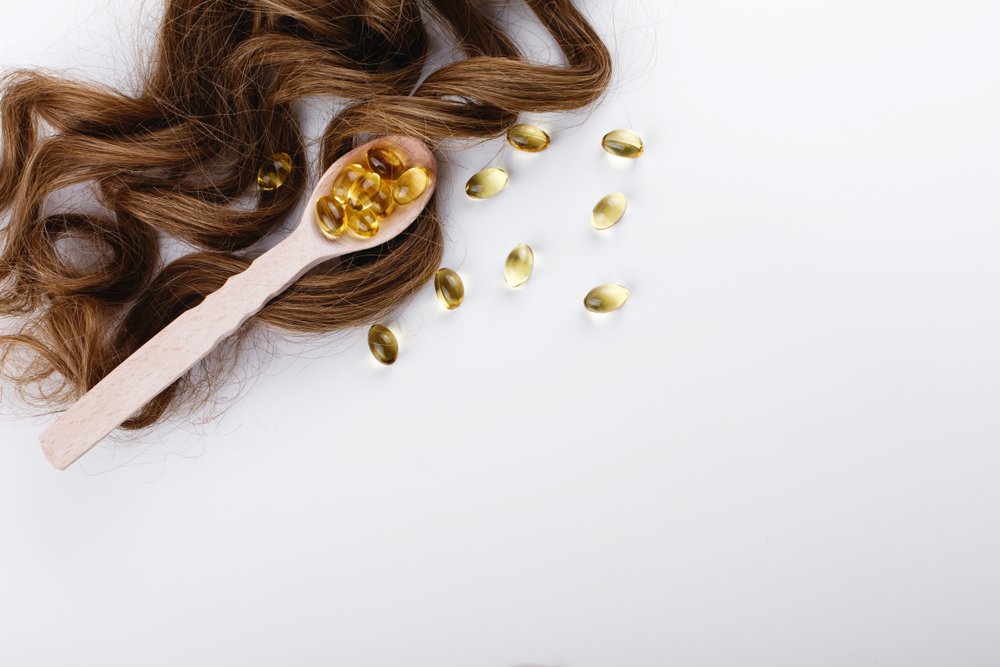Thick, voluminous, elastic hair like in shampoo commercials seems like an unattainable dream to many women. But scientists assure that everyone can have them. It’s enough to pay attention to the additives for hair. What should be in the composition and are there any alternatives? The First Doc. tells us.
Hair vitamins: myths and facts
Manufacturers of nutritional supplements develop their formulations to give every hair a growth boost. They promise to increase length by record centimeters per month, make strands more flexible and elastic, and increase their shine. But which of these is true and which is a myth?
““Hair growth supplements are indicated for anyone who suffers from thinning and losing strands and for those who want thicker, longer hair,” says Dandy Engelman, M.D., a dermatologist.
When a person takes a supplement, it is absorbed into the bloodstream and nourishes all cells, including the hair follicles. For a person who doesn’t get enough nutrients from his or her food menu, supplements can help make up the deficiency.”
However, when buying vitamins for hair growth, a woman should understand that they will contribute to increasing the length of the hair only if the body is already deficient in certain substances. No supplement can “bypass” genetics and have no effect on hereditary factors – the thickness, density, maximum length and strength of the hair.
Women who get a healthy, balanced diet are not likely to see the benefits of taking supplements. And if they take vitamins for a long time in doses exceeding the norm, unpleasant side effects may occur. Therefore, the intake of any supplement should always coordinate with your doctor.
The 5 best vitamins for hair growth
Without which vitamins can you forget about the health and beauty of your curls?
1. Vitamin A

Vitamin A is known for its “healing” properties in the prevention of visual impairment. Studies have proven that it prevents the occurrence of age-related macular degeneration and other diseases. This vitamin is also useful for the support of the immune system, the prevention of viral diseases.
And few people know that the concentration of vitamin A determines the rate of hair growth. A study cited in Biochimica et Biophysica Acta showed that vitamin A deficiency can lead to hair follicle damage and hair loss, as well as a host of other health problems.
“Vitamin A deficiency can slow down the formation of new cells in the body,” explains dermatologist Elizabeth Houshmand, M.D. – Its effect extends to the hair as well.
How much is needed? The daily rate of vitamin A for people over 18 years of age is 1,300 mcg/day.
What foods do they contain? Sweet potatoes, pumpkin, yams, and carrots are rich in beta-carotene, which the body converts to vitamin A. The valuable vitamin is also found in animal products such as milk, eggs, fish oil, and yogurt.
Caution. Not everyone can take vitamin A supplements. Women who are preparing to conceive, are pregnant, or are breastfeeding should not take the supplement.
Also keep in mind that high concentrations of vitamin A in the body are as dangerous as a deficiency. Studies show that it can provoke liver damage.
2. B vitamins
B vitamins also have a lot to do with the growth and beauty of your hair. They are involved in the production of red blood cells, which deliver oxygen and nutrients to the scalp cells.
Scientists know eight B vitamins and they are all important for human health. But it is biotin that is the number one remedy for hair loss. A 2017 study published in the journal Skin Appendage Disorders found that this vitamin improves hair and nail health in people who are deficient.
How much is needed? The daily requirement of biotin for humans is 25-30 mcg and vitamin B12 is 2.4 mcg.
What foods are found in? B vitamins are found in whole grains, nuts, eggs, meat and fish, seafood, and dark leafy greens. Yeast, beef liver and kidneys, egg yolk and peanuts, sardines and mushrooms are the main sources of biotin.
3. Vitamin C

One of the common causes of hair thinning and stoppage of hair growth is cell damage by free radicals. Their concentration in the body increases due to external negative influences and under the influence of destructive habits. Vitamin C is a powerful antioxidant that can counteract this.
Another important role of vitamin C is participation in chemical reactions of the body, which are necessary for the synthesis of collagen, the structural component of healthy hair. The vitamin also helps to assimilate iron, on which the health and growth of strands depends.
How much is needed? The daily requirement for vitamin C for an adult is 90 mg.
What foods do you find in? Strawberries, apples, citrus fruits, guavas, tomatoes, blackcurrants, rose hips, sweet peppers, and all types of cabbage are a treasure trove of vitamin C.
Getting valuable vitamins from food is impossible to create a surplus of them, which cannot be said about vitamin complexes from the pharmacy. Therefore, the best way to get vitamins is through a thoughtful, healthy diet.
4. Vitamin D
“Sunny” vitamin, as vitamin D is also called, helps the body absorb and assimilate calcium and magnesium from food, important for heart, vascular, and bone health. Its role in maintaining healthy hair is still poorly understood, but it is already known to increase hair follicles in the scalp.
A scientific paper published in 2019 presented findings that people with vitamin D deficiency are more likely to suffer from alopecia.
How much is needed? The daily allowance of vitamin D for an adult is 600-800 IU.
What foods does it come in? To get the right amount of the “sunshine” vitamin, you need to walk in the sun for at least 15 minutes every day. Exposure to sunlight increases the concentration of vitamin D in the body. In addition, the vitamin can be obtained from foods such as fish, seafood and dairy products.
5. Vitamin E

Like vitamin C, vitamin E is an antioxidant. It plays an important role in maintaining a woman’s health and beauty, helping to keep her skin, hair and nails young and healthy.
In one study involving people with diagnosed alopecia, there was a 34.5% increase in hair growth after taking vitamin E supplements for 8 months. But you can also get the vitamin from healthy foods.
How much is needed? The daily norm of vitamin E for an adult is 10-12 IU.
What foods is it found in? The valuable vitamin is found in many tasty foods-nuts and seeds, fresh leafy greens, avocados, legumes, eggs, sea fish, and almost all vegetable oils.
Hair growth can be stimulated by vitamin supplements. Spinach, nuts – including cashews and assorted nuts, yams, fresh berries – raspberries, strawberries, blackberries and others, as well as bell peppers when added systematically to the diet strengthen hair roots and indirectly promote hair growth.
An organic complex of vitamins and minerals, including burdock and argan oil, helps to preserve and make hair thicker. Castor oil and honey and pepper lotions are also useful for hair.
There are special shampoos that promote hair growth, their name usually includes the word “equine”. Vitamin C complex, beta-carotene and vitamin D using sea buckthorn will also not be superfluous in the daily food basket.
Vitamins alone will not ensure hair growth, but with a sufficient dose, which a doctor will help to calculate correctly, taking into account the growth and body weight of the particular person, and regular application, can form and develop the external and internal root sheaths of hair follicles with the surrounding epidermal tissues, and thus promote hair growth.
Oils and moisturizing compositions of honey and burdock are recommended to strengthen the hair roots.
If symptoms or signs of deteriorating hair quality or quantity arise, the first thing your hand reaches for is vitamins. Especially since pharmacy shelves and advertising vied with each other to guarantee “magical” results from capsules and pills. But is it really so?
The realities of the current “fashion for correcting deficiencies” have not only exacerbated existing problems (e.g., iron, vitamin D3 deficiencies), but have also led to frequent overdiagnosis of deficiency conditions up to and including vitamin and micronutrient overdose, which is even more dangerous to health.
Modern trichology (the science of the hair follicle, the scalp, and the hair shaft) says there are no miracles.
The hair follicle is a microorganism with its own requests, genetic potential and reactions to exogenous factors: climatic (ultraviolet light, low temperatures); exposure to hair dryer, ironing, coloring, wearing tight hairstyles or pads, using the wrong products. After understanding the possible causes of hair deterioration, it becomes clear that vitamin deficiency is only one of the causes.
What vitamins and minerals are most important for hair? This can only be detected by determining blood values.
Reduced blood iron levels lead to changes in hair shaft quality and hair loss. Since this trace element is one of the components of hemoglobin and is involved in the transport of oxygen to tissues, it is also part of the hormones that regulate the functioning of the hair follicle. The best absorption of iron is promoted by vitamin C as a catalyst, but calcium can slow down the process of absorption.
Copper reduction is also important. Copper is involved in energy production at the cellular level, in the production of melanin (the pigment that determines hair color) and in the normal functioning of the nervous system, is a part of some enzymes, and also contributes to the absorption of iron.
Zinc is another important micronutrient. It should be noted that the chelated forms of zinc are preferable to inorganic compounds, such as zinc sulfate, for assimilation.
Omega 3-6-9 fatty acids, B vitamins and folic acid are also necessary for optimal scalp health and excellent hair health.
All vitamins and micronutrients are important for the proper functioning of the hair follicle, but you should not expect excessive stimulation from vitamins. It is always a complex effect and a synergy of drugs.
Source:
- Diab L, Krebs NF. Vitamin Excess and Deficiency. Pediatr Rev. 2018 Apr;39(4):161-179. doi: 10.1542/pir.2016-0068.
- Thomas-Valdés S, Tostes MDGV, Anunciação PC, da Silva BP, Sant’Ana HMP. Association between vitamin deficiency and metabolic disorders related to obesity. Crit Rev Food Sci Nutr. 2017 Oct 13;57(15):3332-3343. doi: 10.1080/10408398.2015.1117413.
The articles on this site are for information purposes only. The site administrators are not responsible for attempting to apply any recipe, advice or diet, nor do they guarantee that the information provided will help or harm you personally. Be cautious and always consult a doctor or nutritionist!
*All products recommended by thefirstdoc.com are selected by our editorial team. Some of our articles include affiliate links. If you buy something through one of these links, you help us earn a small commission from the seller and thus support the writing of useful and quality articles.





